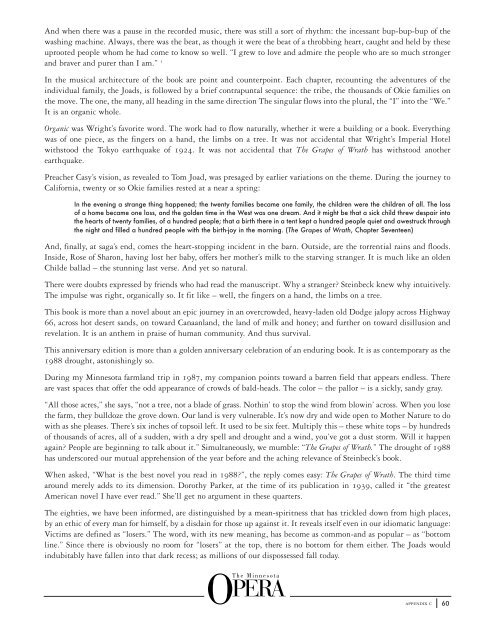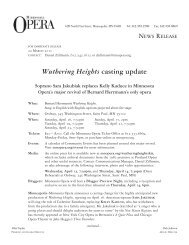Create successful ePaper yourself
Turn your PDF publications into a flip-book with our unique Google optimized e-Paper software.
And when there was a pause in the recorded music, there was still a sort of rhythm: the incessant bup-bup-bup of the<br />
washing machine. Always, there was the beat, as though it were the beat of a throbbing heart, caught and held by these<br />
uprooted people whom he had come to know so well. “I grew to love and admire the people who are so much stronger<br />
and braver and purer than I am.” 1<br />
In the musical architecture of the book are point and counterpoint. Each chapter, recounting the adventures of the<br />
individual family, the Joads, is followed by a brief contrapuntal sequence: the tribe, the thousands of Okie families on<br />
the move. The one, the many, all heading in the same direction The singular flows into the plural, the “I” into the “We.”<br />
It is an organic whole.<br />
Organic was Wright’s favorite word. The work had to flow naturally, whether it were a building or a book. Everything<br />
was of one piece, as the fingers on a hand, the limbs on a tree. It was not accidental that Wright’s Imperial Hotel<br />
withstood the Tokyo earthquake of 1924. It was not accidental that The <strong>Grapes</strong> of Wrath has withstood another<br />
earthquake.<br />
Preacher Casy’s vision, as revealed to Tom Joad, was presaged by earlier variations on the theme. During the journey to<br />
California, twenty or so Okie families rested at a near a spring:<br />
In the evening a strange thing happened; the twenty families became one family, the children were the children of all. The loss<br />
of a home became one loss, and the golden time in the West was one dream. And it might be that a sick child threw despair into<br />
the hearts of twenty families, of a hundred people; that a birth there in a tent kept a hundred people quiet and awestruck through<br />
the night and filled a hundred people with the birth-joy in the morning. (The <strong>Grapes</strong> of Wrath, Chapter Seventeen)<br />
And, finally, at saga’s end, comes the heart-stopping incident in the barn. Outside, are the torrential rains and floods.<br />
Inside, Rose of Sharon, having lost her baby, offers her mother’s milk to the starving stranger. It is much like an olden<br />
Childe ballad – the stunning last verse. And yet so natural.<br />
There were doubts expressed by friends who had read the manuscript. Why a stranger? Steinbeck knew why intuitively.<br />
The impulse was right, organically so. It fit like – well, the fingers on a hand, the limbs on a tree.<br />
This book is more than a novel about an epic journey in an overcrowded, heavy-laden old Dodge jalopy across Highway<br />
66, across hot desert sands, on toward Canaanland, the land of milk and honey; and further on toward disillusion and<br />
revelation. It is an anthem in praise of human community. And thus survival.<br />
This anniversary edition is more than a golden anniversary celebration of an enduring book. It is as contemporary as the<br />
1988 drought, astonishingly so.<br />
During my <strong>Minnesota</strong> farmland trip in 1987, my companion points toward a barren field that appears endless. There<br />
are vast spaces that offer the odd appearance of crowds of bald-heads. The color – the pallor – is a sickly, sandy gray.<br />
“All those acres,” she says, “not a tree, not a blade of grass. Nothin’ to stop the wind from blowin’ across. When you lose<br />
the farm, they bulldoze the grove down. Our land is very vulnerable. It’s now dry and wide open to Mother Nature to do<br />
with as she pleases. There’s six inches of topsoil left. It used to be six feet. Multiply this – these white tops – by hundreds<br />
of thousands of acres, all of a sudden, with a dry spell and drought and a wind, you’ve got a dust storm. Will it happen<br />
again? People are beginning to talk about it.” Simultaneously, we mumble: “The <strong>Grapes</strong> of Wrath.” The drought of 1988<br />
has underscored our mutual apprehension of the year before and the aching relevance of Steinbeck’s book.<br />
When asked, “What is the best novel you read in 1988?”, the reply comes easy: The <strong>Grapes</strong> of Wrath. The third time<br />
around merely adds to its dimension. Dorothy Parker, at the time of its publication in 1939, called it “the greatest<br />
American novel I have ever read.” She’ll get no argument in these quarters.<br />
The eighties, we have been informed, are distinguished by a mean-spiritness that has trickled down from high places,<br />
by an ethic of every man for himself, by a disdain for those up against it. It reveals itself even in our idiomatic language:<br />
Victims are defined as “losers.” The word, with its new meaning, has become as common-and as popular – as “bottom<br />
line.” Since there is obviously no room for “losers” at the top, there is no bottom for them either. The Joads would<br />
indubitably have fallen into that dark recess; as millions of our dispossessed fall today.<br />
appendix c<br />
60








